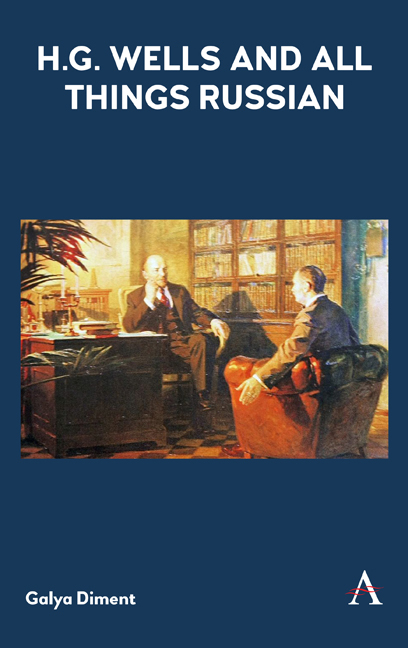Book contents
- Frontmatter
- Dedication
- Contents
- List of Illustrations
- Acknowledgments
- List of Contributors
- A Note on Transliteration
- Introduction: “The Wells Effect”
- Part One WELLS IN RUSSIA: PRE-WORLD WAR II
- Chapter One Yevgeny Zamyatin and the Wellsian Utopia
- Chapter Two Time Machines and Metamorphoses: H. G. Wells's Influence on Mikhail Bulgakov and Sigizmund Krzhizhanovsky
- Chapter Three “The Wellsian Twist” in Nabokov's “Terra Incognita”
- Part Two WELLS IN RUSSIA: POST-WORLD WAR II
- Part Three RUSSIA IN WELLS
- APPENDIX TRANSLATIONS
- Bibliography
- Wells, Herbert George – Works Index
- General Index
Chapter One - Yevgeny Zamyatin and the Wellsian Utopia
from Part One - WELLS IN RUSSIA: PRE-WORLD WAR II
Published online by Cambridge University Press: 06 September 2019
- Frontmatter
- Dedication
- Contents
- List of Illustrations
- Acknowledgments
- List of Contributors
- A Note on Transliteration
- Introduction: “The Wells Effect”
- Part One WELLS IN RUSSIA: PRE-WORLD WAR II
- Chapter One Yevgeny Zamyatin and the Wellsian Utopia
- Chapter Two Time Machines and Metamorphoses: H. G. Wells's Influence on Mikhail Bulgakov and Sigizmund Krzhizhanovsky
- Chapter Three “The Wellsian Twist” in Nabokov's “Terra Incognita”
- Part Two WELLS IN RUSSIA: POST-WORLD WAR II
- Part Three RUSSIA IN WELLS
- APPENDIX TRANSLATIONS
- Bibliography
- Wells, Herbert George – Works Index
- General Index
Summary
Introduction
In his study Herbert Wells (‘Gerbert Uells’, 1922), Yevgeny Zamyatin characterizes H. G. Wells's method of social transformation as ‘more national than personal’. Recruiting medical metaphor, he notes that his English counterpart attempts to cure the old order without eradicating it completely: Wells prefers therapy to the surgery of the knife. Zamyatin assigns such preferences to the history of England, which, unlike other European nations, has ‘never “overthrown,” “overturned,” “destroyed,” or “started everything from the beginning”’. Zamyatin discerns continuity in the alleged absence of radical upheavals and fresh starts. By contrast, he links his own method to revolution, when, in the programmatic essay ‘On Literature, Revolution, Entropy, and Other Matters’ (‘O literature, revolutsii, entropii i prochem’, 1923), he admits that revolution ‘is a leap, it is a break in the smooth evolutionary curve, and a break is a wound, a pain’. To be sure, Zamyatin understands revolution in a metaphysical sense, as ‘a cosmic, universal law’, not a singular event. For that matter, the Russian Revolution can be no more than ‘only one of an infinite number of numbers’. For Zamyatin, continuity has a strictly national and historically ascertainable undertow, while revolution amounts to a cosmic process. By this logic, Wells privileges improvement on an existing system, whereas Zamyatin invests in newness, which has no foothold in either history or national impulses.
Drawing on Zamyatin's appraisal of Wells, this article examines the major parameters of the Wellsian utopia alongside his evolutionary ideas and notion of modernity. Our further discussion explores the national predispositions of Wells's conception, contextualizing it in his changing views of the nation-state during the interwar period, his experience of the Bolshevik project of social transformation in Russia, and his relation to the English myth of continuity and its ramifications. The article maintains that, offset by certain things Russian, the Wellsian utopia endorses a blending of socially transformative forces. Wells regards revolution as a metaphysical and methodical step-change, rather than wreckage, inadequacy and disruption. For him, revolution is the outcome and form of continuity. Zamyatin, in turn, uses Wells to mediate his own attitude to the Bolshevik project as a brake on an infinite revolution.
- Type
- Chapter
- Information
- H. G. Wells and All Things Russian , pp. 13 - 30Publisher: Anthem PressPrint publication year: 2019



